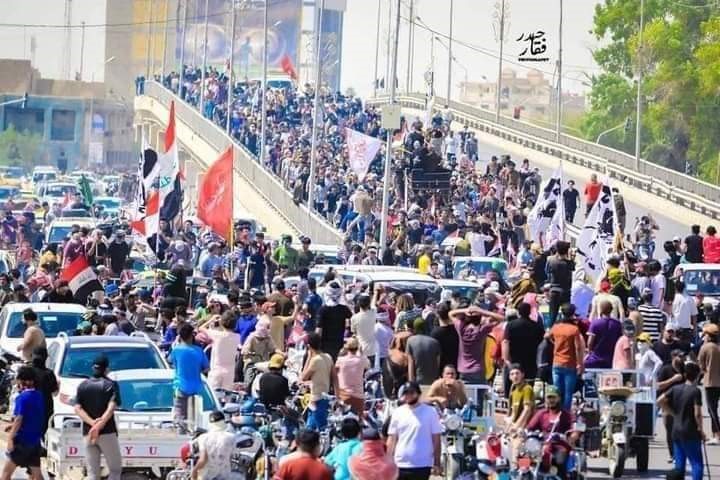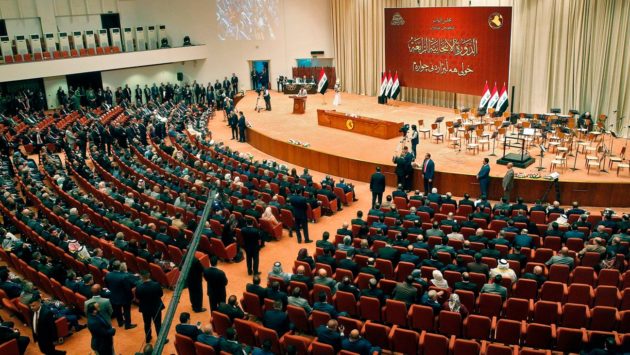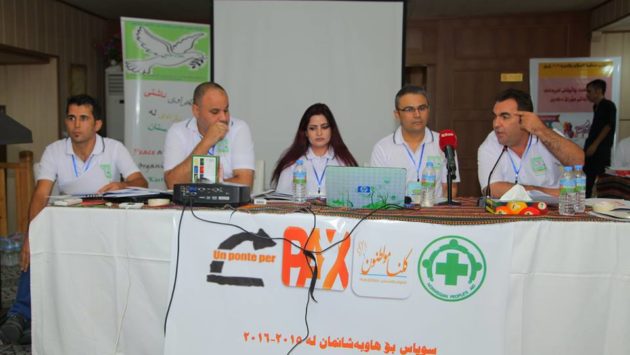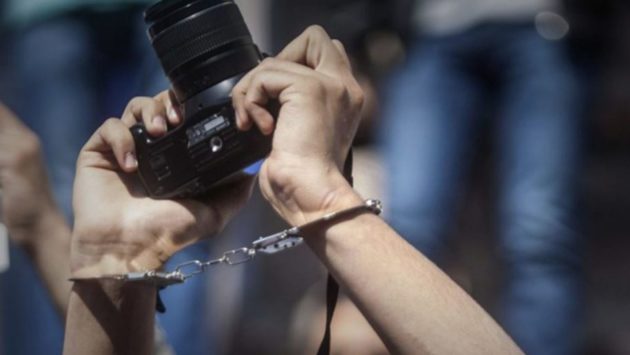The 8th report of the Iraqi Observatory for Workers and Employees Rights
For the period: (1st of April – 30th of June) 2022
The Iraqi observatory team for workers and employees’ rights has documented all the violations that the workers and employees were exposed to, which can be summarized as the following:
1- Iraq has been listed as one of the world’s worst countries for employee rights, by the Workers’ Rights Indicator.
The World Union for Syndicates, has issued its report for the year 2022, which is related to the World’s Workers’ Rights Indicator, and Iraq came up as a 5 on the indicator category, for not having systems in place to guarantee the rights of workers.
The 10 worst countries according to the Workers’ rights indicator are Bangladesh, Belarus, Brazil, Columbia, Egypt, Estonia, Guatemala, Philippines, Turkey and Iraq.
The report for Iraq is available here.
2- The Standards Implementation Committee for the World Work Organization lists Iraq on their short list.
On 10th of June, 2022 , the Standards Implementation Committee for the World Work Organization, endorsed the necessity for Iraq to commit to implementing the International Standards as per the 1987 & 1998 Agreements, on the Freedom and Right to Syndicalism Organization and Collective Negotiations. It has been ensured by the Iraqi Unions and Syndicates for Workers Conference, in its statement, that the decision taken by the International Standards Committee has confirmed the Iraqi Syndicalistic Movement’s calls on the necessity to work in order to cancel the current unjust Syndicalistic Organizing Law No. 52 (1987), as well as to legislate a new modern and just law which will include all the production sectors (public, private, mixed and cooperative). It also wishes to ensure the right of collective negotiations in order to defend the rights and interests of Iraqi workers.
3- Demonstrations and stands for some ministries’ contract workers.
- On the 2nd of April, there was a demonstration by contract workers in the Kar investment company, which works for Shatt Al-Arab River and Ar Rumaylah power stations, for ignoring their demand, for the company to relieve a group of them from work.
- On the 18th of May, there was a demonstration by contract workers in the Babylon Governorate, to demand a permanent contract.
- On the 7th of June, there was a demonstration by the Ministry of Electricity contract workers, for all the governorates in front of the parliament building in Baghdad, to demand permanent contracts.
- On the 9th of June, there were demonstrations on the streets of Basra against a nutriment security law which causes job scarcity, as it was not what the Parliament had promised before endorsing the law. The streets that lead to oil companies in Basra were blocked as part of the demonstrations.
- Also on the 9th of June, there was a protest stand inside the fertilizer factory of Basra, for contract and daily-payment workers, as they were not included in the nutriment security law.
- On the 10th of June, the Basra-Baghdad highway was also blocked by contract workers, for not including them in the nutriment security law.
- On the 11th of June, contract workers closed Al-Shu’aiba oil refinery for not giving them a permanent contract, even though they are suitably qualified, but they have been marginalized by the nutriment security law.
- On the 12th of June, contract workers closed Dhi Qar health building as part of a protest, for not including them in the nutriment security law to guarantee permanent contracts, and for not counting them within the 315 decisions.
- On the 28th of June, there was a protest stand for the graduates of science colleges in front of the Ministry of Health building to demand the following:
- Pay the salaries of the hired employees for 7 months.
- Include the patronizing jobs in the local hiring.
- Justify the ones who are hired as replacements.
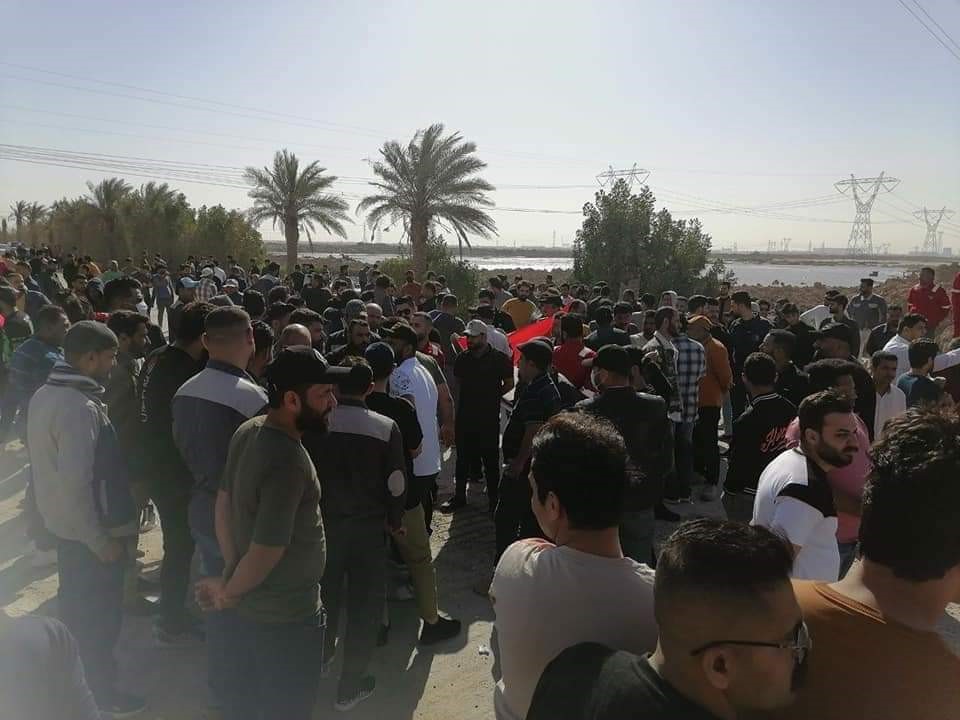
4- Ministry of Education demonstrations
- On the 3rd of April, there was a teachers’ strike in Sulaymaniyah, Halabja and Garmian due to the delays in their salary payment, and the issues regarding their promotions being on pause since 2014.
- On 8th of May, there was a demonstration by lecturers in Baghdad in front of the Parliament building to demand they receive permanent contracts.
- On the 10th of May, the lecturers of Dhi Qar closed the Governorate Education Building and set up tents in front of it demanding they also receive permanent contracts.
- On the 10th of May, there was a demonstration by the lecturers of Al-Najaf demanding to turn them into the 315 contracts.
- On the 15th of May, a demonstration by Al-Diwaniyah lecturers, threatened to block streets to pressure the Federal Government and the Parliament to implement their demands, and to include them in 315 decision.
- On the 20th of May, hundreds of lecturers protested in front of a Parliamentarians’ office in Diyala Governorate, demanding they receive permanent contracts.
- On the 24th of May, there was demonstration by lecturers and administrates in front of the Education building of Basra, demanding an adjustment of their salaries, according to the 315 decision, to include them in nutriment security law and permanent contracts.
- On the 27th of May, there was a continuous demonstration by the lecturers of the Educational Directorate of Dhi Qar and they continued to close the directorate building, demanding to be included in the 315 decision and receive permanent contracts.
- On the 31st of May, there was a demonstration by the lecturers in for all the Governorates in front of the Parliament building, demanding to include them in the 315 decision and to add them into the nutriment security law.
- On the 21st and 22nd of June, there were protest stands by the lecturers and administrates in front of the 5th gate of the Green Zone, demanding the Council of Ministers treat them like their colleagues in the other Governorates, as well as issue an administrative order containing contracts for them.
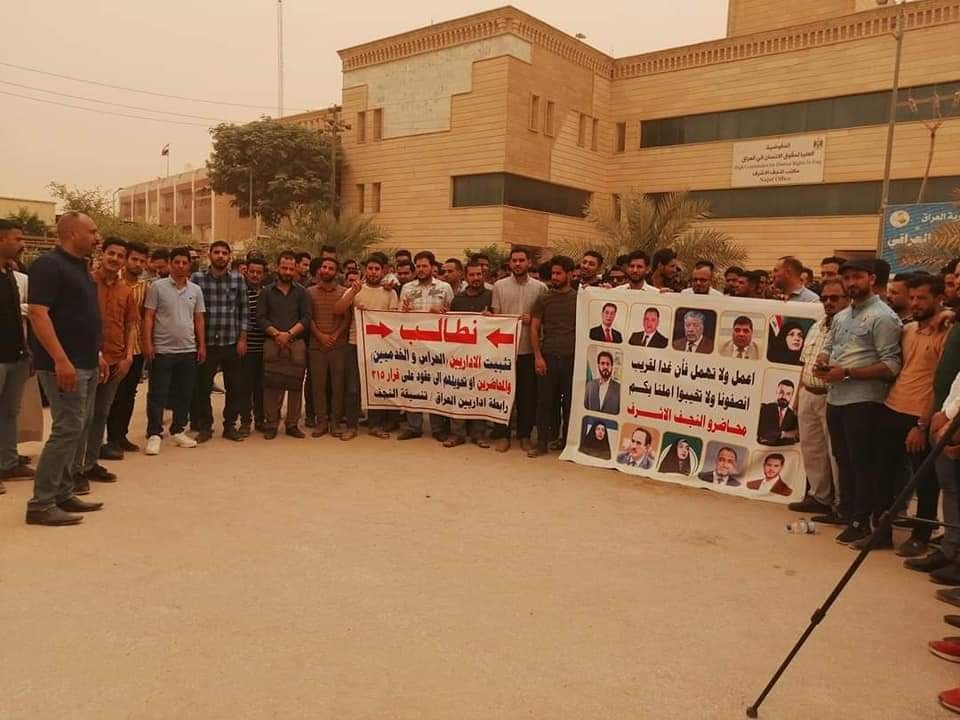
5- Demonstrations for the daily-payment workers
- On the 6th of April, there was a demonstration by the daily paid workers in the oil pipelines company of Basra, demanding renewal of their contracts.
- On the 11th of April, there was a demonstration in front of the Ministry of Education building, to demand that the Council of Ministers turn them from daily- payment workers to workers having Ministerial contracts.
6- Demonstrations demanding job opportunities
- On the 8th of May, a number of graduates renewed their demonstration in front of the Dhi Qar Oil Company, to demand job opportunities, while hundreds of others raided Al Habobi Square in the center of the Nasiriyah, renewing their demands for job opportunities within the Governmental infrastructure contracts. Dozens of non-lecturer graduates also gathered in front of the Educational Directorate of Dhi Qar, demanding job opportunities like their lecturer colleagues.
- On the 9th of May, there was a demonstration by a number of workers in front of Dhi Qar oil company, demanding job opportunities.
- On the 10th of May, college graduates closed the oil distribution in Dhi Qar, to demand job opportunities.
- On the 10th of May, a group of trainees that worked for Al-Shamal Oil company for 4 years, while waiting for a contract that never materialized, demonstrated and closed the Parliament building of Kirkuk as a result. Also on the 1st of June, they closed the Parliament building of Kirkuk until their demands are met.
- On the 15th of May, the protesting graduates closed the oil refinery of Dhi Qar, demanding job opportunities.
- On the 17th of May, the engineers of Basra continued to protest, and they closed the main gate of Basra Oil company.
- On the 30th of May, there was a demonstration for the top students graduates in front of the Prime Minister’s office, demanding he finish the process of organizing their contracts.
- On the 30th of May, there was a protest for agricultural engineering graduates in Dhi Qar’s Agriculture building, demanding job opportunities.
- On the 7th of June, the lecturers of Babylon blocked the street that leads to the neighboring Governorates, demanding job opportunities.
- On the 7th of June, there was a demonstration for oil engineers in front of the Ministry of Oil building, demanding job opportunities. They also renewed their demonstration on the 22nd of June in front of the service board building, demanding to be exempt from the budget since the oil companies are profit companies with self-fund.
- On the 14th of June, a demonstration was launched by the graduates of the medical, health and nursing professions in front of the Prime Minister’s office in the Green Zone to get an exception and initiation.
- On the 14th of June, there was a demonstration by the graduates of Dhi Qar, demanding job opportunities within the Governmental infrastructures.
- On the 19th of June, the graduates and the free workers renewed their demonstration in Al Habobi Square in the center of Dhi Qar, demanding job opportunities.
- On the 19th of June, education department graduates and education administrators blocked the Amarah – Al Musharrah – Bazirkan road, demanding to be included in the 315 decision to launch the elimination and modernization of jobs, considering that the 1000 job opportunities are unfair and violate their rights.
- On the 27th of June, there was a demonstration for dozens of graduates and free workers from Al Neser, Al Fajr, Rifai and Qalat Sukar districts of Dhi Qar in front of the Garraf Oil Field, demanding job opportunities.
- On the 27th of June, a demonstration was launched by the top college students, demanding job opportunities after being included in the nutriment security law.
- On the 27th of June, there was a demonstration by higher education graduates, who demanded:
- Delivery of the names of the attendees to the Prime Minister to exempt them.
- The Minister of Finances to fund poor people by giving them job opportunities provided for by the nutriment security law.
- On the 29th of June, there was a demonstration by the graduates of the Institute of Oil in front of the Ministry of Oil, demanding job opportunities.
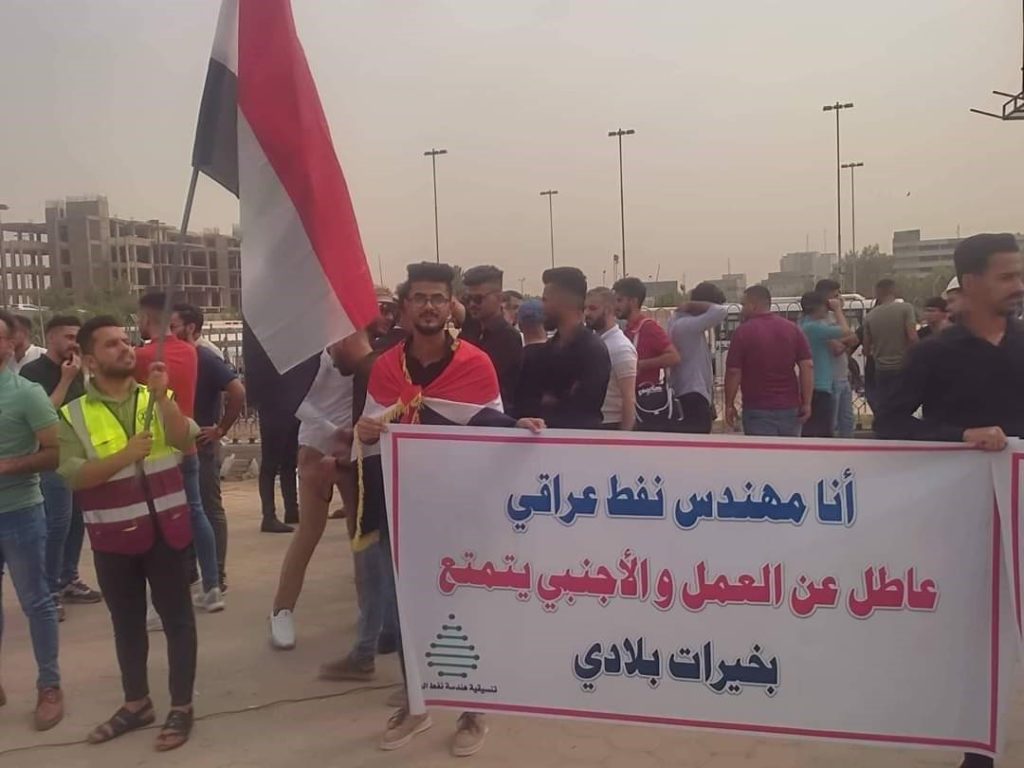
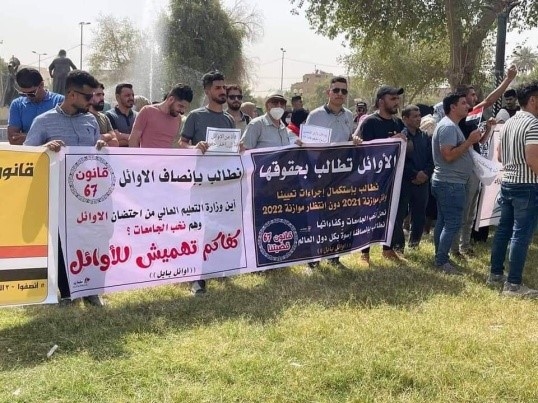
7 -Protests by employees of the Ministry of Industry and Minerals
- Demonstration by the workers of the Naseej al-Kut factory on 5/10 for the non-establishment of the Wasit governorate pension fund by receiving the pension transactions of the employees referred for retirement in the factory due to the non-payment of the company’s pension suspensions.
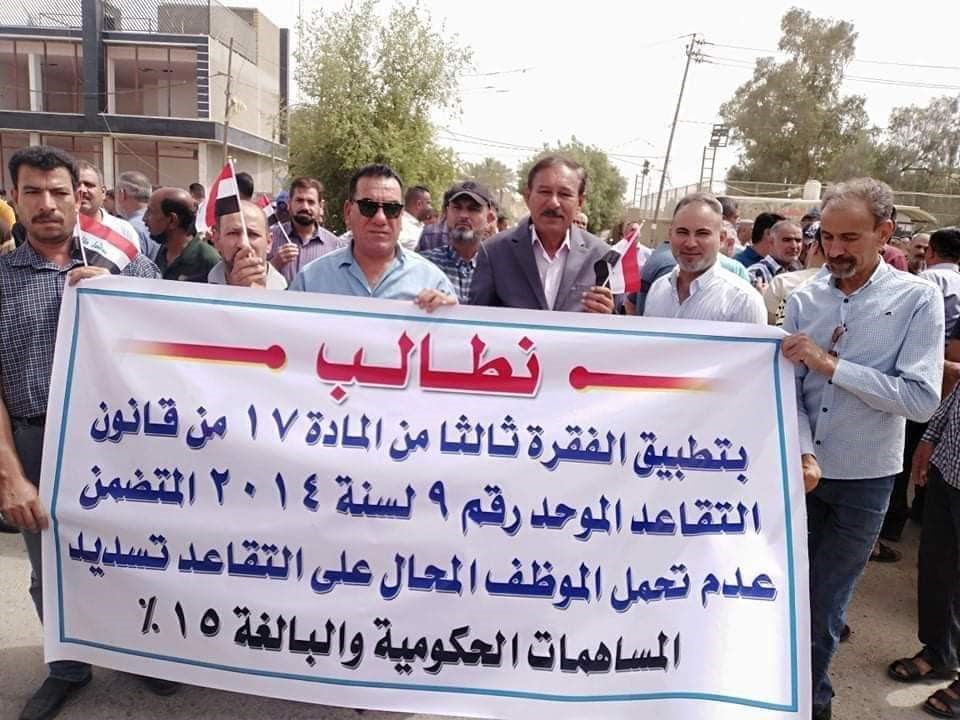
8 – Government Service Demonstrations
- On the 4th of May a Demonstration of cleaners in the Kalar district of the Karmian Administration for non-payment of salaries.
- on the 11th of May the Closure of the Dhi Qar Municipal Property Section following an attack on employees in the Dhi Qar Governorate Centre
- On the 16th of May Cardian Cleaners’ Demonstration in Kafri District,they decided to strike because their salaries were reduced from 300,000 to 150,000.
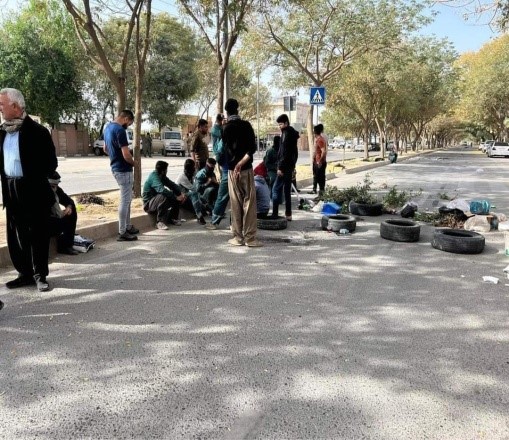
9- Ministry of Oil workers’ demonstrations
- On the 17th of May A number of Basra Petroleum Company (Basra Oil Company) employees organized a moratorium within Basrah Oil Company requesting recognition of their school certificates degrees to added to their Salaries.
- On the 10th of June the South refineries’ workers demonstrated demanding that their certificates be counted.
- On the 15th of June A demonstration for contracts 315-174 all oil companies and from all governorates in front of the Ministry of Oil in Baghdad to demand the confirmation of permanent owners and include them in the planning budget of the oil companies for 2022 after completing all the requirements.
- On the 22nd of May Dozens of oil companies workers with expired contracts demonstrate near the Beer 20 site demanding their reinstatement and demanding central and local government’s for their reinstatement and inclusion in resolution 192;Year 2021
- On the 23rd of June Basra Oil Company workers demonstrated to demand that their certificates be included to their Salaries
- On the 25th of June A number of employees of the Petroleum Products Company of the Ministry of Oil organized a demonstration in front of the Ministry of Oil to demand the distribution of land parcels, the calculation of additional hours, equity of alternates and health insurance work.
- 6/26 Demonstration of dozens of drilling company employees at the entrance of oil companies in the Burjsa area west of Basra governorate where demonstrators blocked the entrance road of Beer20 to quickly demand the integration of the drilling company with the National Oil Company and increase the incentive of employees with the allocation of land parcels for them.
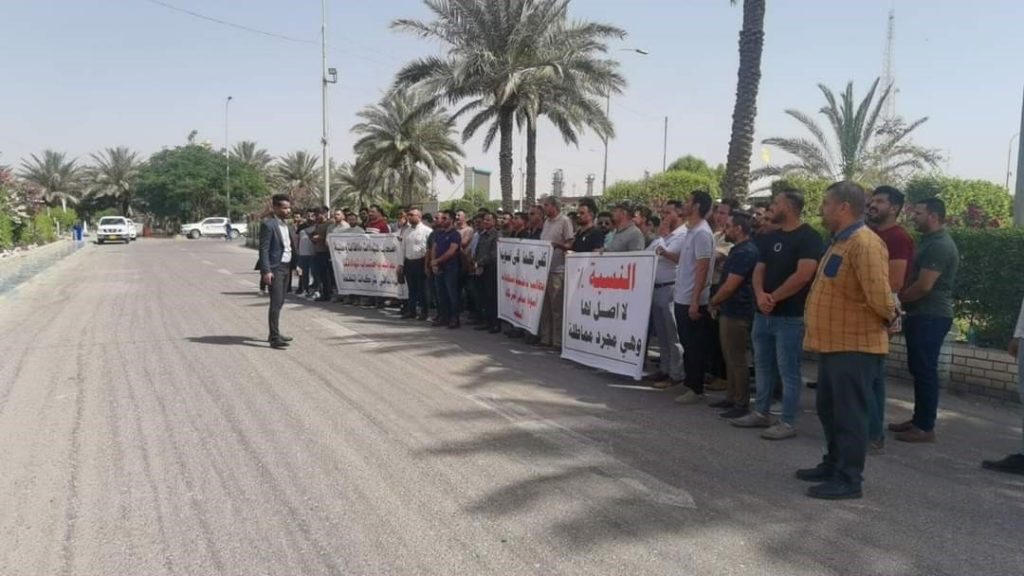
10. Ministry of Electricity demonstration.
- On the 27th of April Several employees of the Sulaymaniyah-Karmian Directorate of Electricity gathered and beaten for not receiving the third month’s salary, threatening to cut off power
- On the 7th of June A demonstration of the Ministry of Electricity’s metrological readers demanding their continued confirmation with government Work.
- On the 20th of May Staff from all ministries demonstrated in Baghdad to modify the status of salaries and allowances and to lift injustices against holders of preparatory certificates and fourth-degree residences
injuries and deaths
| No. | Governates | Month | Injuries | Deaths | Notes |
| 1 | Saladin | April | 1 | 1 | Worker Yousif Hadi al-Ghariri died at Salah al-Din Distribution Directorate, Al-Budaythah area, after suffering an electric shock. |
| 2 | Duhok | April | 1 | 1 | 30-year-old worker died while working on top of Dohuk Ridge building |
| 3 | Nasiriyah | May | 3 | 1 | A construction worker died and three others were seriously injured after a water tank fell on them while working on the local administration stadium project in Dhi Qar |
| 4 | Sulaymaniyah | May June | 3 | 1 | Three workers injured while working in Clare District after roof collapse, One of the buildings where they worked on, the death of a worker from a 14-storey residential project building. |
| 5 | Al Diwaniyah | May | 1 | 1 | One employee was injured by a suicide attempt in front of the Diwaniyah building Because of the marginalization of his rights. |
| 6 | Erbil | May | 1 | 1 | The death of a worker and the wounding of another after they fell from one of the buildings in Erbil governorate because there are no safety procedures. |
| 7 | Basra | May | 1 | A worker injured by explosion of Iraqi-Iranian remnants of war landmines in Saybah area | |
| 8 | Baghdad | May June | 1 4 | Four workers died at a Laila restaurant in the Jadiriyah area of central Baghdad following the collapse of the restaurant due to an explosion whose causes were unknown Lebanese worker dies at Mesaj centre in central Baghdad without any known details | |
| 9 | Karbala | June | 1 | Karbala employee died after being severely beaten. |
Iraqi observatory for workers and employees’ rights (Brief Summary)
Since the establishment of the Iraqi observatory for workers’ and employees’ rights in early 2020 by a group of syndicate activists, civil society activists,
and defenders who believe in syndicate liberties and social justice, for what the workers and employees endure from injustice and violations by the hand of government and employers, also for what the political and union circumstances due to the lack of just laws that would protect workers and their syndicates which led to the regression of liberal syndicates. The observatory aims to observe, document, evaluate workers’ and employees’ rights, and create reports, studies and present them to interested parties regarding their findings, accompanied by suggestions and recommendations aiming to reinforce workers’ rights and syndicate’s liberties in the republic of Iraq in addition to providing moral and physiological support through providing counsel and studies to provide an appropriate working environment. It aims also to enforce democratic concepts by building peace to ensure the rights of these marginalized groups- The observatory does not consider itself to be a replacement for governmental institutes but a partner, since its members are part of society that inspires its sense of nationality and Sense of responsibility in growing society and maintaining its earnings and rights to determine the issues and place working solutions through the reports, hence deliver it to relevant parties as the observatory ensures positive approaches and non-violent methods of expressing opinions, condemning violations and demanding rights and non-violence and trespassing public and private properties ensuring the growth of social peace which is a necessary factor for an improved society
Observatory management

